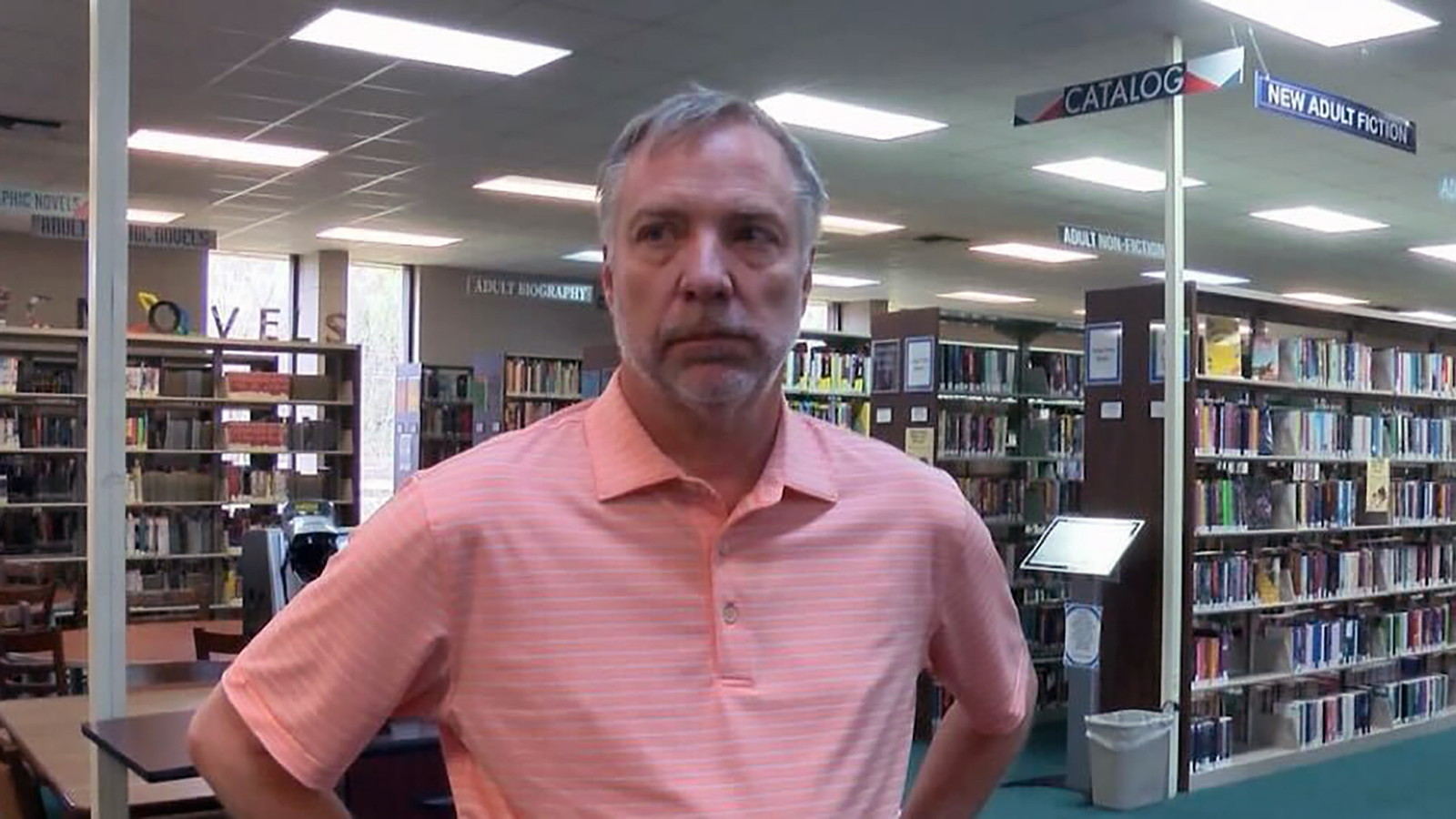|
Getting your Trinity Audio player ready...
|
In the wake of the chaotic termination of Autauga-Prattville Library Director Andrew Foster, APPL Board Chair Ray Boles claimed to several media outlets that he never intended to move LGBTQ+ books out of children’s or young adult sections.
New recordings released by Foster Friday alongside demands for retractions, apologies and reinstatement appear to support Boles’ statements.
The board has operated in relative silence under Boles—no board member has said a word in public meeting since January—so there has been little to go on outside of the new policies themselves.
Those policies, passed on Feb. 8, clearly go beyond prohibiting sexual content in books for minors, to include “sexual orientation, gender identity and gender discordance.”
Boles voted along with the rest of the present board members in support of those policies, and did not discuss them, leading to the appearance that the board supported Clean Up Alabama’s goal of preventing LGBTQ+ materials from children’s and young adult sections.
Indeed, three days after the board passed the new policies—with assistance from Clean Up Alabama associate and attorney Laura Clark—Clean Up Alabama celebrated on X (formerly Twitter).
“(Praise the Lord)! Victory in Prattville!” the group posted on Feb. 11. “Local parents fought a months-long battle to protect children from sexualized content resulting in a brand-new library board that just passed sweeping policies to ensure the protection of children!”
And when the Autauga County Commission appointed Boles, Rachel Daniels and Logan Strock to serve alongside Doug Darr, Clean Up Alabama Executive Director Hannah Rees bragged on a Facebook group for Moms for Liberty – Madison County that “We got three solid board members appointed by the county tonight.”
“That means we will have 4 of the seven and have the majority!!! Waiting on two more appointments but likely these will be favorable if things go according to plan.”
Boles has clearly demonstrated his desire to find a compromise
While Boles ultimately approved of policies that directly aligned with Clean Up Alabama’s goals, it appears that he was unaware or failed to understand exactly how those policies would be implemented.
Appearing on “News and Views” with Joey Clark on the right-wing radio station 93.7 WACV Montgomery, Boles said that he can neither read nor write due in part to his struggle with dyslexia. Boles has not been shy about letting people know that he has the disability and either cannot read or write, or is a very slow reader and writer.
So it’s unclear how the policies were presented to him by Clark and other members of the board. Daniels apparently worked with Clark to draft the policies. APR reached out to Ray Boles for clarification, but Boles said he did not “wish to comment any further to anyone regarding the library.”
But back when Boles was talking to APR, in his very first interview he balked at Rees claiming he was on their side.
“I really want everyone to just calm down. Our community is made of many different beliefs and many different people,” Boles said at the time. “The library is not paid for by one group; the library is for everybody and should be welcoming and safe for everybody. I want to be part of making that happen.”
When APR called Boles more recently to ask about the 113-book list that had been shared with Foster, he told APR he would not talk because he considers the outlet “fake news.”
However, earlier in that same call, he appeared confused that someone was calling him back from “16 News (1819 News).” Boles explained that he had called the far-right media site to complain about an opinion piece that had been written (APR later pinpointed this as an opinion by Eagle Forum’s Lori Herring) about how a group of citizens “took on city hall and won.”
“These people are driving me insane writing all these articles from this Read Freely bunch—not the Read Freely, the Clean Up Prattville,” Boles said. “And I’m like ‘Hey, y’all don’t need to be printing this because it’s a bunch of lies.’ … There’s an article they wrote—they didn’t write it, it’s an opinion piece that somebody wrote that ticked me off—and I was calling them telling them they don’t need to be running opinion pieces unless they call me and ask me about it.”
So there has been an obvious gap between a perception that Boles is working for Clean Up Alabama and the man’s own words since he stepped in as chair of the library board.
New recordings provide support for Boles’ statements that he wanted to distinguish “sexual content” from “LGBTQ content”
As part of his demand for a retraction from Boles that he had attempted to frustrate the process of moving books, Foster released four recordings of meetings or phone calls with Boles between Feb. 26 and March 12.
The Feb. 26 recording sounds to be a recording of Boles and Foster in Foster’s office, 12 days after the bylaws and policies committee held an unlawful subcommittee meeting in Foster’s office.
The list of books appears to have been spurned from that unlawful Valentine’s Day meeting, although the minutes are rough and do not specifically mention the list at all, much less what was discussed in regards to the impetus of the list.
“This is the list,” Boles tells Foster, apparently handing him the list. “If you have any concerns about it not being sexual in content, please highlight ‘em and get back with me. If they’re not sexually heightened—what I don’t want to do is if it has two dads in a book, pull it. If it has two moms in a book, I’m not worried about that. If it’s a color crayon getting to another colored crayon, I’m not worried about that.
“What I’m after is sex and sexuality. If two dads are making out in a book, we gotta talk about that, OK?”
The “color crayon” comment is apparently in reference to “Red: A Crayon’s Story” about a blue crayon stuck in a red wrapper, and the identity crisis that creates. The book was challenged by Clean Up Alabama for gender ideology.
This is another strong indication that Boles splits with Clean Up on whether it is the library’s place to move LGBTQ content from sections targeted at minors. This, of course, is just Boles’ stance and not necessarily the stance of the board, which Foster must answer to as a whole, not as individuals.
Boles did not tell Foster during the meeting that the list had been generated by Clean Up Alabama, and there is no further indication that Foster knew how the list was generated. Boles asked Foster to keep the matter private “until you start doing” because “I don’t want a bunch of blow up.”
On March 1, Foster emailed Boles the list with books highlighted, and detailed his concerns about books on the list that did not fit the selection criteria.
On March 4, Foster recorded Boles stopping by his office to further discuss the list.
“So the yellow ones you’re saying have nothing to do with sex or sexuality—and the ones that aren’t highlighted, are?”
“Possibly,” Foster replied. “I tried to make it a very wide spectrum.”
There appears to be potential miscommunication between Boles and Foster next—Boles asks Foster “Are these the books?” Foster replies that , yes, they are the books, and Boles asks about affixing red labels to them and moving into the adult section.
Foster had pulled all of the books on the list. It is possible Boles was asking if they were the books that Foster had determined did not have sexual content.
Foster then told Boles that the policy doesn’t actually seem to mention moving books already in the collection, other than by a vote of the board.
Boles notes that he “isn’t here to make everybody happy” and that there was no way to keep both sides happy. After being advised by Foster that a board vote would be best, Boles asks Foster to keep the books in his office until a decision can be made. It is again unclear whether Boles is referring to the entire list of books, or only the books that have been found to have sexual content.
The next recording is of a phone call from Boles to Foster on March 8 and starts with Boles telling Foster about a phone call he got from APR reporter Jacob Holmes asking about the book list. Foster had sent the book list in response to an Open Records Act request from Holmes.
“I told him I view his outlet as fake news and I wasn’t going to tell him a damn thing,” Boles said. “And then I tried to call 1819 News because they had some article that somebody wrote from the other side, that Clean Up Prattville crap, bragging about how they did all this, and did all that. I’m going to have them take it down because they never called anybody. I don’t talk to those people. So I don’t know what the hell they’re talking about, but I want it down … both of them irritated the piss out of me today.”
During the phone call, Boles suggests that “we all need to sit down and talk, together, so we’re all on the same page.”
“Because I’m getting one thing from you, and one thing from Laura (Clark) and then Logan (Strock) is saying ‘Laura’s right’ and then Rachel (Daniels) is saying ‘Well, I think Laura’s right’ and Quincy (Minor) is like ‘Well, I don’t know, I would like to have more clarification,’ and everybody needs more clarification at this point.”
Not only is Boles apparently admitting an improper serial meeting violating the Open Meetings Act, he is also seeming to ask Foster about getting the board together to deliberate outside of an open meeting.
“I think the only way that happens is if we all sit down and talk, but we can’t do it as a ‘board;’ what committee do you want to sit down with?” Boles asks.
Committee meetings in most cases must also be open to the public.
On this recording, Boles clarifies that he wants the whole list pulled off the shelves, not just the non-highlighted books, until the board can decide what to do.
“For the rest of the books on the list, can we have those puled before that meeting, so we can just look at them and go over them?” Boles asked. “So we can go over them and decide which ones fit the policy and which ones don’t—because there again, what I don’t want at all to look like we are attacking the LGBTQ community. That’s what I keep preaching to Rachel too, ‘Look Rachel, we cannot give any kind of view that we’re attacking the community, because we’re not.
“If this is truly about sex and sexuality, we cannot worry about the books that don’t have it in there; I’m not worried about them. There’s got to be a line somewhere … we just gotta figure out where that line is. What I don’t want to do is look like we’re a bunch of redneck hicks attacking the LGBTQ community in Prattville, Alabama.”
The final recording is a brief phone call from Boles to Foster on March 12, one day after APR released a story about the emails regarding the book list.
In the brief phone call, Boles tells Foster that there needs to be a meeting called on March 14 to discuss the good name and character of an employee and that “you need to be there too.”
Of course, that meeting ultimately led to Foster’s termination and the chaos that ensued, and led to Foster’s demand for reinstatement, retraction and a name-clearing hearing from the board, as well as retractions, corrections and apologies from Boles and Clark for defamatory statements made in the wake of the events.
The board, Boles and Clark have until Friday to respond to Foster’s demands before Foster will begin pursuing legal action.






















































